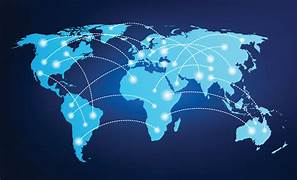Economic International Relations: Geopolitics and Relevance
December 24, 2024 2024-12-20 11:35
Economic International Relations: Geopolitics and Relevance
In an increasingly interconnected world, economic international relations play a crucial role in shaping the global political and economic landscape. These relations encompass trade, investment, fiscal and monetary policies, and strategic alliances between nations. Geopolitics, as a key component, significantly influences economic decisions, setting the course for development, security, and global cooperation.
The Importance of Economic International Relations
Economic international relations are essential for sustainable development and global prosperity. Through these relations, countries gain access to markets, resources, and technologies, fostering economic growth and stability.
- Promote international trade: Facilitate the exchange of goods and services between nations, creating interdependent economies.
- Encourage foreign investment: International agreements attract capital investment in key sectors.
- Drive technological development: Cooperation enables access to innovations and technical knowledge.
- Contribute to political stability: Economic alliances can reduce geopolitical tensions and foster peace.
Geopolitical Factors Influencing Economic Relations
Geopolitics defines how countries interact and collaborate economically. Factors such as strategic location, natural resources, and government policies shape the dynamics of international relations.
Natural Resources and Competition
Resources like oil, gas, and minerals are fundamental in economic geopolitics. Resource-rich countries often hold a strategic advantage in international trade.
- Energy dependence: Importing nations rely on economic agreements with resource-exporting countries.
- Resource conflicts: Competition for scarce resources can lead to tensions between nations.
- Strategic investments: Resource-abundant nations attract foreign investment for exploitation and development.
Economic Blocs and Regional Alliances
Economic blocs and regional alliances are key instruments for strengthening international relations.
- European Union (EU): A prime example of economic integration fostering trade and political stability among its members.
- North American Free Trade Agreement (NAFTA): Encourages trade between the United States, Mexico, and Canada.
- Association of Southeast Asian Nations (ASEAN): Promotes economic growth in Asia.
Geopolitical Conflicts
Political tensions and armed conflicts have a direct impact on economic relations.
- Economic sanctions: Used as a tool to exert political pressure on specific nations.
- Regional instability: Conflicts can disrupt supply chains and affect global markets.
- Trade wars: Disputes between major economic powers can alter global dynamics.
Challenges in Economic International Relations
While economic international relations offer multiple benefits, they also face significant challenges.
- Protectionism: Adopting protectionist policies can restrict trade and limit access to foreign markets.
- Economic inequality: Disparities between developed and developing countries can hinder economic cooperation.
- Climate change: The need for sustainable policies affects global economic decisions.
- Technological advancements: Rapid digitalization poses challenges for regulating global economies.
Strategies to Strengthen Economic Relations
To overcome these challenges, nations must adopt strategies that promote cooperation and inclusive economic development.
Fair Trade Agreements
Negotiating agreements that benefit all parties involved is essential to fostering equitable economic relations.
- Reducing trade barriers: Facilitate access to international markets by eliminating tariffs and quotas.
- Promoting sustainable trade: Integrate environmentally friendly practices into agreements.
- Protecting labor rights: Ensure fair working conditions in global supply chains.
Innovation and Technology
Cooperation in innovation and technology is key to global economic growth.
- Technology transfer: Promote the exchange of technical knowledge between nations.
- Investing in digital infrastructure: Expand access to digital technologies in emerging economies.
- Regulating disruptive technologies: Establish global standards for artificial intelligence and e-commerce.
Economic Diplomacy
Economic diplomacy is a powerful tool for building strong international relations.
- Multilateral dialogue: Facilitate discussions between nations to address common challenges.
- Resolving trade disputes: Use international mechanisms to settle economic disagreements.
- Strengthening regional cooperation: Encourage partnerships between neighboring countries to maximize mutual benefits.
Benefits of Economic International Relations
Economic cooperation between nations generates tangible benefits that impact both national and global levels.
- Economic growth: International relations drive job creation and industrial development.
- Access to global markets: Trade agreements allow businesses to expand their reach and increase revenue.
- Cultural exchange: Economic cooperation fosters understanding and interaction between diverse cultures.
- Joint innovation: International collaboration accelerates the development of technologies and solutions.
The Future of Economic International Relations
As the world continues to face global challenges such as pandemics, climate change, and geopolitical tensions, economic international relations must evolve to ensure sustainable and equitable development.
- Green finance: Integrating environmental goals into economic decision-making will be essential for addressing climate change.
- Global digitalization: Adapting to the increasing digitalization of trade and financial services will be crucial.
- Inclusive cooperation: Ensuring developing nations have a voice and access to global economic benefits will be critical.
Conclusion
Economic international relations, influenced by geopolitics, are fundamental to global well-being and stability. From trade agreements to strategic alliances, these interactions shape the global economy and impact the lives of millions. Addressing current and future challenges requires a combination of innovation, cooperation, and sustainability. Understanding the relevance of these relationships is essential for any student, professional, or individual interested in global development.
Related Posts
Economic International Relations: Geopolitics and Relevance
December 24, 2024 2024-12-20 11:35Popular Tags





























